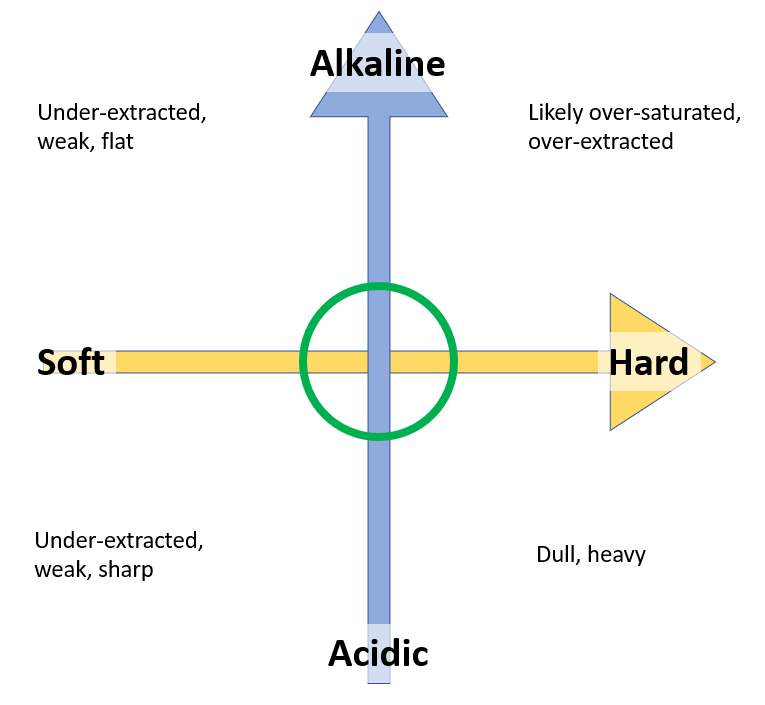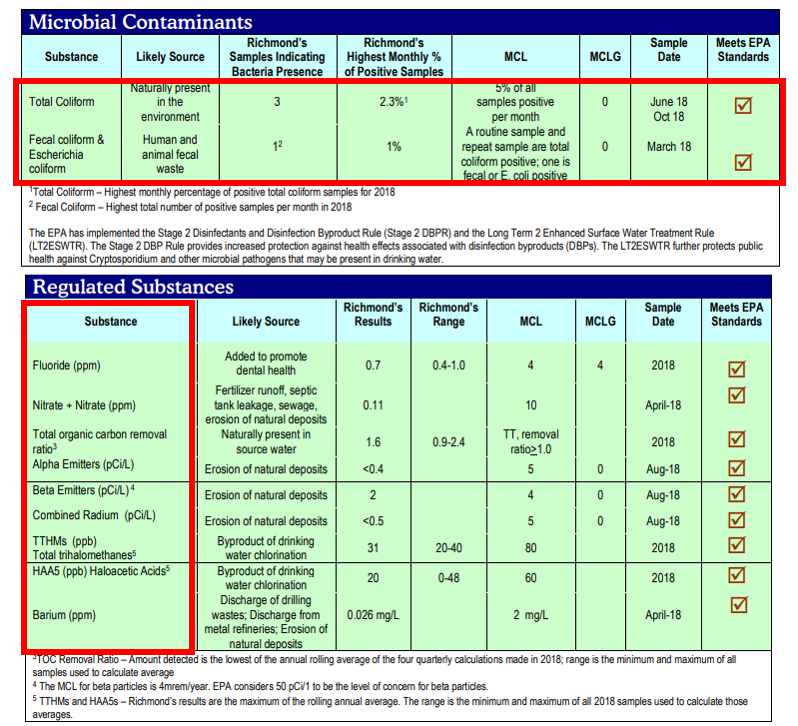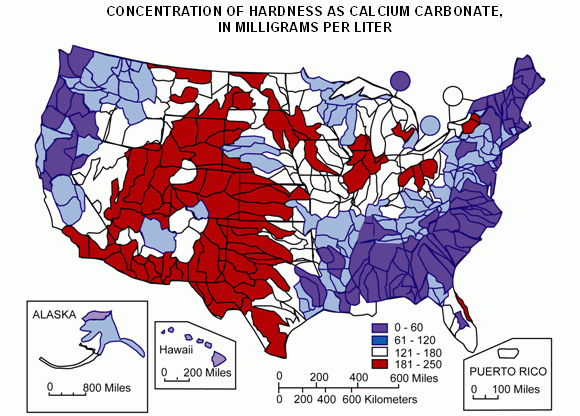What is the best water for deliciously tasting coffee? We have already determined that an appropriate brewing temperature is among the critical aspects of brewing. We have also established that contrary to a popular belief, coffee makers do not purify water. The quality of water is essential in brewing a delicious cup of coffee. Owly Choice reader Brent recently reached out to us with the question…
What is the best water for coffee? Is it ok to use tap water to brew a cup of coffee?
Owly Choice reader Brent
Questions of whether it is okay to use tap water for coffee, and what kind of water is best to brew a delicious cup of coffee have appeared repeatedly on our Facebook page. We thought we would address some of these questions on our page today.
For starters, many factors are involved in brewing a good cup of coffee. Those factors include, but are not limited to the following:
- an optimal brewing temperature,
- an optimal serving temperature,
- the way we brew coffee,
- quality of coffee beans,
- even the size of the coffee grounds…
And there is also another factor that can influence the taste of coffee: quality of water.
Many people don’t realize how much influence water has on the flavor of coffee. When a cup of coffee seems insipid, tasteless or simply weak, we tend to blame a coffee machine or coffee beans. Rarely, if ever, do we consider that the water we use to brew can impact our favorite coffee beverage.
Is it ok to use tap water to brew coffee?
Whether or not it is okay to use tap water depends on the region you live in. Your location is a single determinant of the quality of water in your area.
Some regions are abundant in amazing tap water. In those areas, rock on! However, most others need to do some extra leg work to make tap water more bearable.
It appears that though using tap water can be a gambling game sometimes, using soft heavily filtered or purified water can put coffee at disadvantage. Why? Stay with me.
What is the best water to brew coffee?
Whether or not you may consider purifying water for your coffee largely depends on where you live.
Water sources are not equal. For instance, while many Montanans can enjoy what their pristine water sources have to offer, people on the East and West Coasts need to do more research.
Tap water contains not just minerals, which typically enrich coffee, but also organic and inorganic chemicals along with other undesirable waste. Knowing that our tap water contains more than what we want (that is, minerals), I’d say: be cautious.
How to check what your local water source contains? Departments of Public Utilities tend to publish reports called “Drinking Water Quality Reports.” Those reports list substances expected in the drinking water based on the reservoirs that serve for drinking water. More on this below.
There are a couple of determinants on what water is objectively best to brew a cup of coffee or even tea.
Water hardness and water pH are pretty good indicators to follow.
Hard water vs soft water – which one is better?
The essential question in the pursuit of improving the quality of coffee is whether hard or soft water is better to brew coffee.
↪ Hard water is rich in minerals, such as calcium and magnesium, which enrich coffee flavors. These minerals bring forward coffee’s acidity. Tap water is usually known to be hard, but that is not always the case. When I traveled in Florida, for instance, I had the opportunity to try coffee made with tap water. Because water was extremely soft (and contained a lot of chemicals), I did not really enjoy my beverage.
↪ On the other hand, soft water is largely devoid of minerals such as calcium or magnesium. This does not help improve the flavor or taste of coffee in any way. When water is heavily filtered or goes through some improperly performed reverse osmosis, many of the minerals are being filtered out. Water becomes flat and empty, and so does a cup of coffee.
→ Why use “hard” water?
Hard water is a much better choice for coffee and tea. This is backed up by scientific research.
Christopher H. Hendon, a chemist at MIT, teamed up with two world champion baristas, Lesley Colonna-Dashwood and Maxwell Colonna-Dashwood, to determine what type of water is better for brewing coffee. Their conclusion was that hard water is a better choice. Why? Because the minerals found in hard water act like magnets for the compounds found in coffee.
These compounds give coffee its aroma and flavors. When coffee is mixed with hard water, these compounds get stuck to the minerals in the hard water, which results in a coffee that is more flavorful. Water rich in magnesium, for instance, contributes to a stronger cup of coffee with higher levels of caffeine.
Soft water, on the other hand, does not have the minerals to interact with coffee compounds. It thus tends to result in coffee that’s always a bit weaker, and a bit less rich.
Christopher Hendon and his colleagues published their research in the Journal of Agricultural and Food Chemistry, and even wrote a book called “Water for Coffee.”
→ Does my area have hard or soft water for coffee?
We have a bit of bad news/good news situation here.
Good news: we have a rough estimate of water hardness across the United States. You are welcome to consult the map with its explanation below.
Bad news: the most recent study on water hardness, which we were able to find, comes from 1975! However, fear not! Water hardness should not have changed so dramatically since 1975 😉
The map above represents water hardness across the United States. Based on the 1975 report published by the United States Geological Survey (source: Briggs, J.C., and Ficke, J.F., 1977, Quality of Rivers of the United States, 1975 Water Year — Based on the National Stream Quality Accounting Network (NASQAN): U.S. Geological Survey Open-File Report 78-200, 436 p.)
Acidic vs alkaline water – which one is best?
Between acidic and alkaline, alkaline water might be a slightly better choice to brew coffee or tea.
↪ Soft water typically has a pH below 7, which makes it more acidic. Acidic water is not great for extraction, but it is slightly better for flavor.
↪ Hard water typically has a pH above 7, which makes it more alkaline. Alkaline water is wonderful for extraction. However, if water is too alkaline, coffee might be over-extracted. On average, doctors recommend that we should consume water that is more alkaline, as it is safer for our health. Tap water usually has a pH of between 6.5 and 8.5, sometimes going as high as 9.
Water that’s between 6.5 and 7.5 pH is typically best for brewing coffee.
Water suppliers tend to keep water on the alkaline side. Acidic water is corrosive and can become dangerous to plumbing.

Is tap water always OK to use to brew coffee? Not always.
That being said, we have to keep in mind that tap water is unpredictable. It will not have the same composition in different places. What’s even more surprising, it will not have the same composition in the same place but at different times.
Although Hendon recommended that we use hard water for our coffee, it is good to keep in mind that tap water can come with elements and minerals that are difficult to predict outside of the sterile lab environment.
According to Hendon, trying tap water is a risk worth taking, because using soft water will not benefit a cup of coffee in any way. On the contrary, what the research showed was that soft water had very bad extraction power.
As we discussed in the article whether a coffee maker purifies water or not, there are a couple of considerations for you to make:
- Because coffee is over 90% water, it should be of high quality. While this is true that oils, flavors and other solvents are extracted from coffee grounds, the vast majority of coffee beverage is water. The taste truly depends on it. We are all for getting high quality coffee grinds. However, they will not go far without contamination-free water.
- Tap water can contain bacteria, fungi, mold and chemicals. It’s extremely difficult to get rid of unwanted particles found in tap water.
- Tap water can be very hard (with a PH of 9 or higher), which can destroy a coffee maker overtime. Very hard water can lead to calcium and magnesium carbonate build ups inside our coffee machines. If you are using an espresso machine or a drip coffee maker to brew your coffee, descaling will have to be done more often when hard water is in use. For those who want to avoid the headache, filtered water and bottled water are much better choices.
Don’t become a victim of scare tactics – get to know your tap water
It is essential to understand the quality of tap water in your community. Therefore, before buying any expensive filtering equipment, I would encourage you to visit the website of your local Department of Public Utilities. Departments of Public Utilities tend to publish “Water Quality Reports” for each year. Those reports should give you an indication about the quality of tap water in your area.
As an example, let’s look over a water quality report available from central Virginia. That should give us enough to understand what to look out for in other reports.
In the example on hand, we can quickly spot tap water contains microbial contaminants. Those microbial contaminants are organisms found in feces (animal and human). Though they are within a “norm” of what EPA specifies, they can be found there, albeit sporadically.
Further, to prevent poisoning, among other things, the local department of public utilities uses many different chemicals, substances or elements. Some of these substances are byproducts of water chlorination.

Further, we can see that water hardness is at about 60 ppm, which puts it as soft water. This water is likely devoid of minerals such as magnesium or calcium to brew a richer and more flavorful coffee.
Additionally, pH is above 7, which means that water is more alkaline. This water source is fine from that perspective.

What would Owly Choice do?
Again: this depends on the area you live in. It appears that in most places in the United States, it might be safer to invest in a quality filtering system. A quality filtering system does NOT remove desirable minerals such as calcium or magnesium.
Instead, a good filtration system removes contaminants that may not only affect your coffee, but also impact your health.
Bottom line
WOW! We thought it was a question with a simple answer. What do you feel is the best water to brew coffee? Do you use tap water in your coffee brewing? What kind of filters do you use to purify your water?
Let us know in the comment section!
Feel free to ask your question via our Facebook page!


Getting the perfect mineral content is what Third Wave Water is all about. I’ve been using it for over a year and both I and my family and guests all make very positive comments about my coffee. We have even conducted a few blind tests with friends and with no exceptions they preferred the Third Wave treated water over tap and purified water. I dont work for Third Wave and I gain nothing by tooting their horn. I’m surprised that such an in depth report doesn’t mention it all all.
I’m in the NYC metropolitan area and our water is usually very good. I do however use. Zero Water filter system for general drinking,watering My orchids and brewing coffee. I’m thinking of trying Third Wave products to remineralize my coffee water. I add MSU Fertilizer to ZW water to feed my Orchids 😀
This is an awesome website. I was just looking how to store coffee and got so much more information.
Hi, Mary,
We are certainly delighted to hear you found our website useful!
We hope our tips and recommendations serve you well!
-Owl
I’m using a Brita filter, is it good enough to filter all these chemicals to brew coffee?
Hi, Stephanie!
Thank you so much for reaching out! Britta filter is good only for minor impurities in tap water. If you are interested in filtering chemicals, you may want to try an osmosis water filter such as iSpring RCC7AK. It filters out some lead, chlorine, fluoride, arsenic, hormones, asbestos, calcium, sodium, bacteria, giardia, viruses.
Those osmosis filters are typically more expensive, and they may affect coffee flavor.
Let me know your thoughts!
Team Owly
This is very thorough. I agree that the best water to brew coffee is slightly harder water that’s more alkaline.
I sometimes use a Britta filter to get some basic filtering.
Hi, Sandra!
Yes! I actually use a simple Brita filter with a pitcher myself. This removes any major impurities, and ensures that the best water is used for brewing a delicious cup of coffee!
Let me know if you have any other tips for brewing coffee!
-Owl